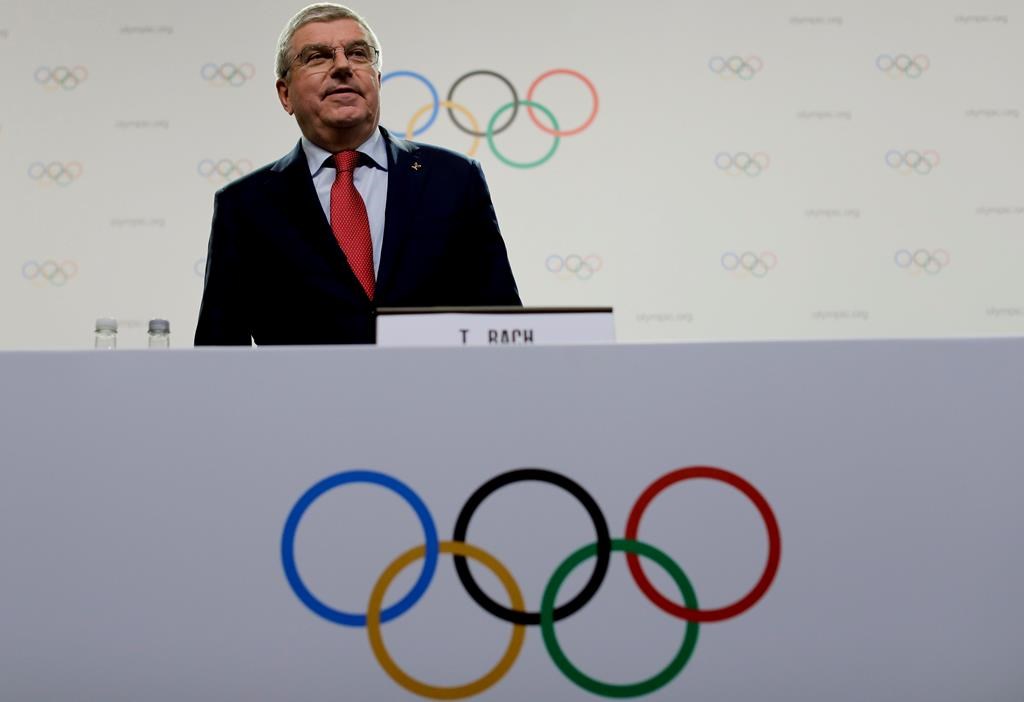The International Olympic Committee (IOC) remains defiant about whether this summer’s Tokyo Olympics could be cancelled, delayed or held without spectators because of the novel coronavirus.

This is despite growing concern and increasingly restrictive measures being imposed around the world meant to either prevent or slow down the spread of the disease.
In a statement released Thursday, the IOC said it expects the Games to begin as scheduled.
“We remain absolutely in line with our Japanese hosts in our commitment to delivering safe Olympic Games in July,” the statement said.
At present, there are roughly 100 million people in China and Italy on lockdown because of the novel coronavirus outbreak. Other countries, such as Argentina, have imposed mandatory quarantines for travellers, while the United States announced Wednesday that it is restricting travel for non-U.S. citizens and permanent residents coming from Europe for 30 days beginning on Friday at midnight.
A growing number of Olympic qualifying events around the world have also been cancelled due to the novel coronavirus and the disease caused by it, COVID-19. This has affected sports such as boxing, judo, three-on-three basketball and athletics.

Still, the IOC, including its president Thomas Bach, have resisted the idea that the Olympics could be affected by the novel coronavirus. The IOC has also refused to confirm whether it has a contingency plan for hosting the Games amidst the novel coronavirus pandemic.
“We are not speculating on any kind of future developments,” the IOC told Global News when asked if it has a contingency plan.

Get daily National news
The IOC also declined to answer questions about whether it is considering hosting the Games without spectators — a decision a number of sports organizations, including in Japan, have made since the outbreak began — nor would it say if it plans to implement additional health and safety measures to protect athletes, officials and spectators.
The comments from the IOC to Global News mirror those made by Bach earlier this month at a press conference where he declined to provide specific details on how the IOC is preparing for the Olympics in light of the novel coronavirus outbreak.
Bach and the IOC have, however, said the health and safety of athletes is a top priority. The IOC has also established a task force to address the novel coronavirus and is working with the World Health Organization and local organizers in Tokyo, including the government of Japan, to address issues around COVID-19 as they arise.
Canada preps for Tokyo
In Canada, athletes are continuing to prepare for the Olympics based on the assumption they will proceed as scheduled.
Marnie McBean, chef de mission for Canada’s Olympic team, says she and the Canadian Olympic Committee are satisfied with how the IOC has handled the novel coronavirus outbreak so far, including its efforts to address concerns around the cancellation of qualifying events.
McBean, who won three gold medals in rowing at the 1996 Olympics, says preparing for the unexpected is an important part of being an Olympian.
In McBean’s case, her third Olympic gold medal came the day after a bomb exploded in Centennial Olympic Park in Atlanta, Ga. It was her focus, she said, that prevented her from panicking and allowed her to win.

And while Canadian athletes are aware of COVID-19 and the potential impact it could have on the Olympics, she says they’re also focused on training, competing and, in some cases, qualifying for Tokyo.
“Olympic medals are won amid chaos as much as they are won with preparation and planning,” she said.
Like the IOC, McBean says the health and safety of athletes remain her top priority and that all decisions relating to COVID-19 and the Canadian Olympic team will be made in consultation with health officials.
She also thinks speculation about the cancellation of the Olympics has become commonplace.
Prior to the 2002 Salt Lake City Olympics, there were concerns that terrorism would prevent the Games from happening, she said. The Vancouver Olympics were held amidst the H1N1 outbreak. And in 2016, concerns about Zika virus prompted questions about whether the Olympics should be cancelled.
“I don’t know of a Games where there hasn’t been something coming up before that has the media and everyone talking about how those Games are going to be derailed,” she said.
Qualifying is the biggest concern
McBean says the most pressing issue facing the Canadian team and would-be Olympians right now is the cancellation of qualifying events due to the novel coronavirus.
The IOC says it is aware of the challenges cancelling or postponing competitions creates for athletes who have not yet qualified for Tokyo and says it is working with international sports federations to make sure the selection process is fair for everyone.
Several Canadian teams have been affected by these changes, including boxing and judo.
On Monday, the International Judo Federation (IJF) announced that all qualifying competitions around the world would either be cancelled or postponed until May. This includes a competition that was supposed to be hosted in Montreal next month.
Patrick Esparbes, a spokesperson for Judo Canada, says he hopes the event will be rescheduled for early May so that athletes can earn points toward qualification. However, he acknowledged that if things with the novel coronavirus haven’t improved by then, or have gotten worse, then there’s a possibility the IJF could make additional changes to its schedule.
At that point, Esparbes said, people may need to start considering whether the Olympics will go ahead as planned.









Comments
Want to discuss? Please read our Commenting Policy first.